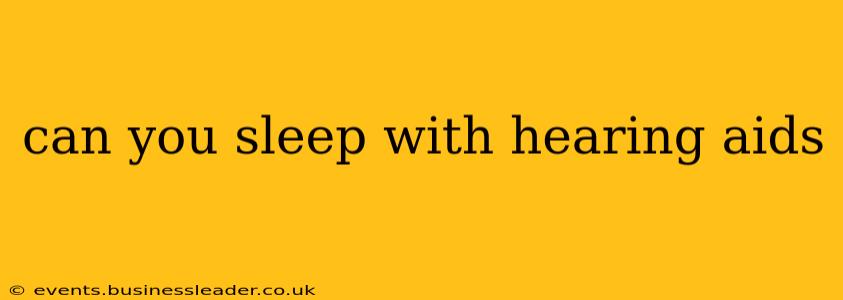Can You Sleep with Hearing Aids? A Comprehensive Guide
Sleeping with hearing aids is a common question among hearing aid users. The answer isn't a simple yes or no; it depends on several factors, including the type of hearing aid you have, your sleeping habits, and your individual comfort level. Let's delve into the details to help you make an informed decision.
What Types of Hearing Aids Are Suitable for Sleeping With?
This is a crucial consideration. Not all hearing aids are created equal when it comes to sleep.
-
Behind-the-Ear (BTE) and Receiver-in-the-Canal (RIC) Hearing Aids: These styles are generally considered less suitable for sleeping with. Their size and position behind the ear can be uncomfortable and potentially lead to damage if you roll onto them during sleep. Furthermore, they are more susceptible to damage from moisture and sweat during the night.
-
In-the-Canal (ITC) and In-the-Ear (ITE) Hearing Aids: These are smaller and fit more discreetly within the ear canal. While potentially more comfortable than BTEs, they still carry the risk of damage or discomfort during sleep. Again, moisture is a concern.
-
Completely-in-Canal (CIC) and Invisible-in-Canal (IIC) Hearing Aids: These are the smallest hearing aid styles and are generally not recommended for sleeping in. Their small size makes them easy to lose or damage during sleep.
The general consensus is that it's best to remove your hearing aids before sleeping.
What Happens if You Sleep with Your Hearing Aids?
The risks associated with sleeping with hearing aids vary based on the style, but some common concerns include:
- Damage: Accidental damage from rolling onto the hearing aid is a real possibility, especially with larger models. This can lead to malfunctions or require costly repairs.
- Discomfort: Hearing aids, even the smaller ones, can be uncomfortable to sleep with. This discomfort can disrupt your sleep, leading to fatigue and reduced sleep quality.
- Moisture Damage: Sweat and moisture from your ear can damage the internal components of the hearing aid, potentially shortening its lifespan. This is a particular concern for those who sleep on their side.
- Infection: Moisture buildup can create a breeding ground for bacteria and potentially lead to ear infections.
- Loss: Small hearing aids can easily be lost during sleep.
What are the Alternatives to Sleeping With Hearing Aids?
If you’re concerned about missing sounds overnight (such as a smoke alarm or a baby’s cry), consider these alternatives:
- Using a bedside alarm clock with a vibrating pad: This provides a silent wake-up call.
- Using a smoke detector with a flashing light: This is a visual alternative to the traditional alarm.
- Employing a baby monitor with visual and audio cues: These offer visual and audio alerts to notify parents.
How Should I Store My Hearing Aids Overnight?
Proper storage is essential to maintain the longevity and performance of your hearing aids. Here are some suggestions:
- Store them in their case: This provides protection from dust, moisture, and accidental damage.
- Use a hearing aid drying kit: These devices help to remove moisture that may have accumulated during the day.
- Keep them in a safe and easily accessible location: This will help prevent accidental loss or damage.
Can I use my hearing aids while swimming or showering?
No, almost all hearing aids are not water resistant and should never be worn while swimming or showering. Exposure to water can lead to significant damage. Always remove your aids and store them safely before getting into water.
By following these guidelines, you can ensure the health and longevity of your hearing aids and get a good night’s sleep without compromising your hearing health. Remember to always consult your audiologist for personalized advice regarding your specific hearing aids and needs.
